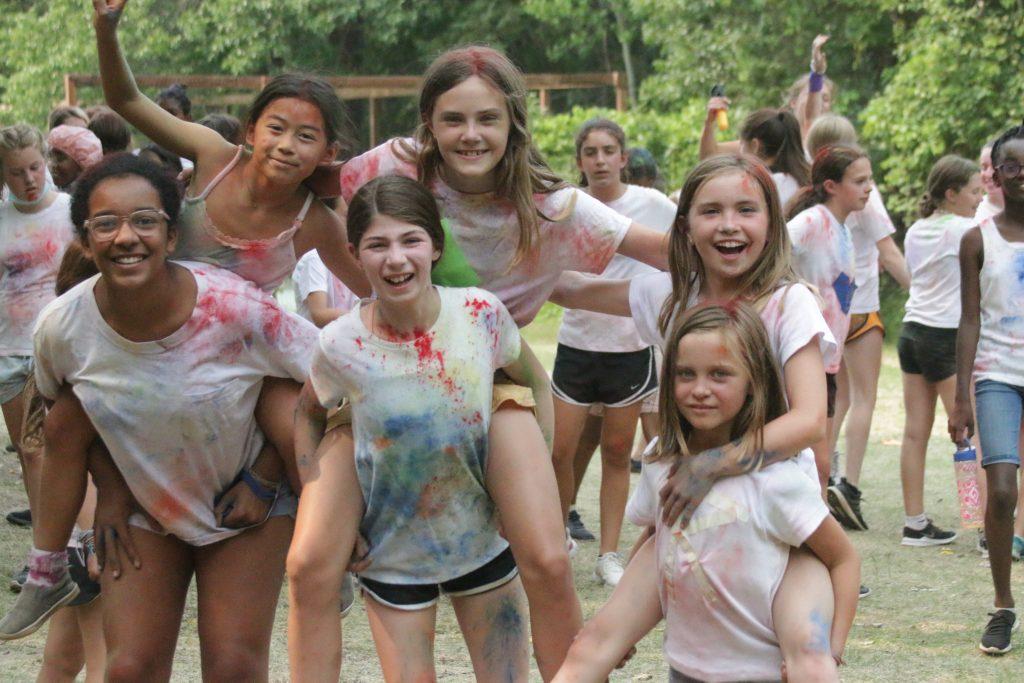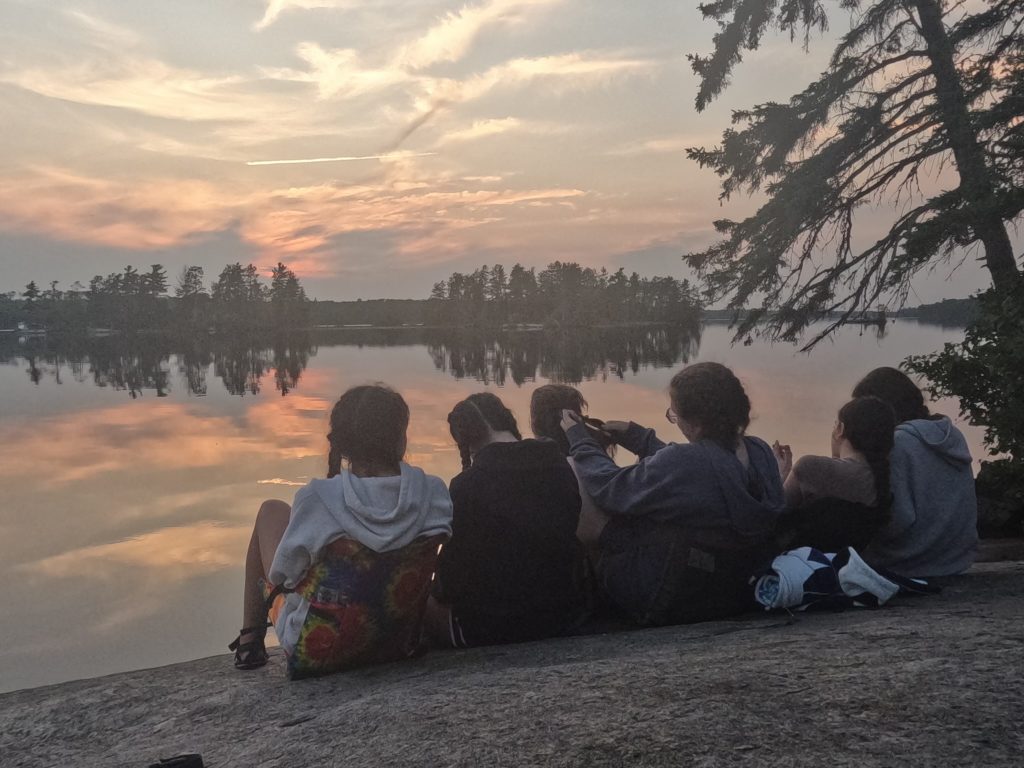Need to start conversations with your daughter? We’ve put together some of our favorite conversation starter ideas for teenagers that will kick-start engaging and meaningful exchanges based on 20+ years of working with teenagers.
From navigating school life to hobbies, relationships, entertainment, and emotional health, we’ve put together a variety of entry points for dialogue with your teenage daughter. Whether you’re looking to bond over shared interests or constructively approach delicate subjects, you’ll find the right “ins” here to open up a world of conversation.
At Camp Kamaji, we know that any conversation is a healthy start. Especially when new campers come to Kamaji for the first time, we’re not going to dive into the deep end with our conversations since we know that any conversation (as casual as it may seem) opens a door to building friendships and finding common interests.
If you want to have deep conversations with your daughter, you need to feel happy starting with surface-level conversation. Listen when she’s willing to talk about what might not seem all that important so that she’ll eventually feel comfortable talking with you about the things that are important.
Creating a Comfortable Environment for Teen Conversations
Encouraging your teen to open up begins with fostering a safe and trusting environment. Ensure they understand their thoughts and feelings are valued and respected, free from judgment or criticism. This means:
- Stepping back sometimes
- Fight your urge to give advice or “fix” a problem for her
- Simply listening
- Validating their experiences and perspectives
- Providing reassurance
- Showing you’re a reliable confidante who’s there for them through thick and thin.
- Ask open-ended questions about whatever topic she’s discussing without trying to guide the conversation toward something you would rather discuss.
- Be authentic
Immerse yourself in her world by engaging in discussions about what feels important to her and participating in her favorite activities. Whether it’s a shared love for a particular book series or treating her to a manicure, these shared experiences can lead to more organic and engaging conversations. By doing so, you’re signaling that her interests matter to you, which can encourage her to share more.
You might choose an activity you both enjoy together to create an opportunity for more comfortable and casual conversation, whether that’s walking the dog, watching silly videos together, making brunch together every Sunday, watching a weekly show together, or joining an exercise class one evening each week.
You could take an evening out with her friends once a week to carpool and get ice cream or have her friend’s family over dinner and just “catch up”. You could plan a road trip together for a weekend where she can help plan the itinerary. This gives you a purpose to having a conversation (“Let’s plan out the rest of that road trip”) rather than having her catch on that you’re trying to start a conversation “just because.”
If she’s having trouble connecting with friends, you can use this article about how to make new friends as a reference.
We find that some of the most interesting conversations come up with our campers at Camp Kamaji in Minnesota when we’re not necessarily “facilitating” a convo – it is often when doing cabin clean-up together side by side or when writing letters during rest period or walking to fill up water bottles together. Since we don’t force a “conversation time” on our campers, ongoing conversations between new friends usually happen over days and weeks of living beside one another.

Campers at Camp Kamaji learn to work together and problem solving helps build amazing friendships
But how do I talk with my daughter about sensitive subjects like mental health, self-confidence, or friendship choices?
Approaching these sensitive discussions requires calmness and care, and these conversations often come up out of necessity and are not something that will casually come up over time with some patience. Sometimes, these sensitive conversations are necessary if you worry about a choice she’s making or have concerns about the consequences of her choices. Sometimes, you’ll hear “through the grapevine” of themes appearing in your teen’s friends’ lives, and you know you want to broach this with your teen. Approaching these topics directly yet leading with empathy is the way to go. It is crucial to give your daughter the space to talk, even when, and especially when, she talks about things that might be difficult to say or hear.
Your teen might not be ready for the conversation when you are. If emotions run high, don’t shy away from taking a break. The goal is to maintain a comfortable space for dialogue where both of you can return to the conversation with clarity and composure. Explain to her that this conversation is a priority for you, invite her to come back to you later that week when she feels prepared to talk.
Conversation Starters for Your Daughter
Unsure of where to start? Initiate with open-ended questions about school, ask about a funny story that happened with her friends, or who she usually hangs out with at lunchtime. You might find that her answers reveal more about what is going on with her than what’s happening around her.
If she’s hesitant to talk about school, you might share a funny or embarrassing story about a teacher or a friend or a gym class that you remember from your high school days. This might open the door to her sharing a similar story or expressing emotions about how she would have felt in that situation. If she is feeling pressured by grades or achievements, validate those worries and balance them out by coming up with a plan to do something fun and as a stress-reliever to build into her daily or weekly routine.
Following that, ask about her personal interests and hobbies. We would be remiss not to mention the prevalence of social media in teens’ lives. Ask her to explain SnapChat to you again or if there is a TikiTok dance trend you should be trying (this should make her laugh). These conversations can serve as a springboard into other conversations that allow for deeper connection with your daughter.
Ask questions about her style choices and contemporary trends. Whether it’s the Stanley or Lulu trend, the latest TikTok craze, a sport she’s playing in school, or a show she would like to see, these topics can be surprisingly revealing. They offer a peek into her values, the cultural waves she’s riding, and what she’s looking forward to. Is she hoping to go to college? Would she prefer a college in a city or something more remote? Something nearby or with some distance to foster some independence? Do you have any friends whose daughters go to a college she’s interested in? Perhaps you can ask her if she wants to visit and stay with the friend’s daughter. Or better yet, plan a trip there together- make an adventure out of it.
Remember, showing genuine interest in her world opens the door to her showing interest in yours.
Digging Deeper: Questions About Emotions and Mental Health
Beyond basic conversations, delving into her emotional and mental health is vital. Start with open-ended questions that express genuine concern and create a secure environment for these deeper discussions. This approach can encourage your daughter to open up about her inner world, including any challenges she’s facing.
Be on the lookout for signs of distress, such as changes in habits or withdrawal, and listen to her concerns without judgment. The goal is to create an environment in which she feels supported and understood, enabling her to eventually express her anxieties, insecurities, and stressors freely, and this takes time to listen to more casual conversation topics.
By showing interest in her current challenges and opportunities and what changes she wishes to see in her life, you’re helping her navigate the complexities of teenage emotions. Some ways to support her include:
- Offering a safe space for her to share her feelings (Why do you think you feel that way about it?)
- Validating her emotions and experiences (I see how that could make you feel _______________)
- Providing resources and support networks (I think Aunt _______ went through something similar)
- Helping her develop healthy coping mechanisms (What’s been helping you get your homework done on time? How do you respond when that happens? How does that situation make you feel?)
- Encouraging self-care practices (Take some time to think about that decision before you make it. Would you like to go for a walk and talk about it?)
- Asking what ideas or solutions she’s coming up with to address some of the challenges she’s having (without offering your opinion until it’s requested)
Regular check-ins can prove to be incredibly beneficial. It’s about setting clear boundaries and fostering open communication, encouraging her to reach out whenever she’s in need. Guide the conversation with empathy, allowing her to take the lead in expressing her feelings while you provide a listening ear and supportive presence.
Strengthening Parent-Teen Relationships
Empathy and communication form the bedrock of a robust parent-teen relationship. You pave the way for openness and sharing when you show genuine interest in her thoughts and feelings. It’s about understanding conversations from her perspective and fostering an empathetic approach to communication, which can strengthen the bond between you.
Sharing personal experiences from your own teenage years can build an emotional connection that goes both ways. It demystifies the idea that parents have it all figured out and shows that you too have navigated the tricky waters of adolescence. Trust-building also involves honest communication and creating a safe space where she can express her feelings freely.
Encourage your daughter to discuss her positive qualities and ask her about her favorite class or new hobbies. These discussions not only focus on her interests but also boost her self-confidence and sense of self-worth. And remember, teaching her how to resolve conflicts through empathy and compromise will serve her well in all her relationships.
Exploring Friendships and Social Life
A teen’s world significantly revolves around friendships and social life. Engage in conversations about peer pressure, which can be a force for both good and bad influences. Social media, too, plays a significant role in amplifying these pressures, and it’s worth discussing how she navigates her online and offline friendships. Encourage teens to talk openly about their experiences to understand their perspective better. Ask questions before jumping to sharing your opinion about a friend or situation.
Probe deeper by asking about the freedom to be oneself, the qualities that make a good friend, and what makes someone a best friend. These conversations can reveal much about her current friendships and her values when it comes to relationships. Talk about your own friendships and highlight the relationships and people who are the most important to you, and why. Don’t shy away from discussing romantic interests either; questions about dating preferences can open up new aspects of her social life.
It’s also important to understand how she handles challenging situations, such as when friends engage in activities she’s not interested in. This can give you insight into her approach to peer influence and her ability to maintain her own identity in the face of social norms.

At Kamaji, common activities become the start of new friendships
Future Plans and Aspirations
Dreams and aspirations fuel our forward momentum. Initiate conversations about her future goals and the steps she’s considering to achieve them. Ask her about her dream job, long-term goals, and how she sees herself contributing to society.
Ask what excites her about college and how she sees it fitting into her life. These conversations can provide valuable insight into her ambitions and the educational path she intends to take.
But it’s not all about positive aspirations. Addressing fears and concerns about the future is equally important. Questions about what scares her the most about her future can help her confront potential obstacles and find ways to overcome them. And remember to encourage personal development by discussing new skills she wants to learn or business ideas she might have.
Opening the conversation with a story about your own concerns can be helpful, but be sure that the attention is not on your heroism for overcoming but as an encouragement to her for what’s possible. Tell her a story about her younger self overcoming a challenge or facing something that was difficult, this will demonstrate how much you admire her but also to remind her of the strengths she already possesses.
Thought-provoking and Intellectual Conversation Starters
Discussing intellectual topics like politics and social issues with your daughter can be enlightening yet challenging. Different personalities are interested in deeper ideas rather than surface-level conversation starters. Here are some tips to help you navigate these discussions:
- Introduce political discussions by exploring why politics matters and how individuals can contribute to good governance.
- Ask family members about important issues (without rebutting an argument or trying to persuade) so your daughter gets to hear diverse political views and have a conversation afterward about your thoughts on those views. Include what past experiences may change how someone views a situation, and ask how her experiences might reflect in her perspectives.
- Encourage her to develop informed opinions by researching and discussing different perspectives. It’s important for her to hear you agree to disagree with someone (and maybe even her).
By following these tips, you can have meaningful and productive conversations with your daughter about politics and social issues.
Ethics and social responsibilities are also thought-provoking topics that can spark deep conversations. Ask her about her views on caring for the planet or the policies she believes should be in place to address societal issues. These discussions encourage her to think critically about her values and the impact she wants to make in the world. Talk about opportunities that could be available to help others and what some possible paths could be to get to those solutions.
Fun and Entertaining Conversation Starters
The best bonding with your teen happens through fun and laughter. Introduce lighthearted hypothetical scenarios to get the creative juices flowing and encourage her to think outside the box. These can lead to hilarious and memorable conversations.
Pop culture is a goldmine for engaging topics. Here are some ideas to talk about:
- Her favorite movie
- Her favorite song lyrics
- The latest celebrity gossip (Taylor Swift and Jason Kelce, anyone?)
- Her favorite TikTok trend
- The funniest thing that she has seen/heard most recently
Asking about her earliest memory can be a great way to bond over shared interests and experiences. How do you remember that situation differently than she does?
Don’t overlook personal preferences for a good laugh. Whether it’s asking about how she would spend a million dollars in a day, choosing one food to eat for the rest of her life, or deciding where to eat lunch, these broad and sometimes silly questions can be a great way to learn more about each other’s quirks and likes.
Enhancing Communication Skills and Confidence
Two-way communication is key and enhancing these skills is crucial for your teen’s development. Active listening, which involves understanding and not just waiting to respond, is crucial. Encourage her to join extracurricular activities or community service to practice these skills in real-life scenarios.
Fostering an environment where opinions can be expressed respectfully, without judgment, is essential for building confidence. Here are some ways to create that environment:
- Avoid interruptions and actively listen when she is speaking (put your phone away!)
- Validate her feelings and let her know that her voice matters.
- Remind her that acknowledging mistakes is not a sign of weakness but a step towards growth.
- You are her parent, that is an important boundary to maintain, but try to talk with her as a peer would, without talking down to her or as if you know more than she- ask her questions and find a place to say, “I’ve never thought about it that way before”.
By following these tips, you can help build confidence and create a safe space for open communication.
Adapting Conversation Starters for Different Situations
Conversations come in various forms, ranging from texting and phone calls to in-person chats. Being aware of your teen’s preferred communication style is important when choosing conversation starters. For texting, mimic their style and use emojis to keep the tone friendly and open-ended questions to encourage dialogue. Send a funny meme, make a joke at your own expense, make a connection during the “in between” times. Don’t try and have important conversations through text. Save those for face-to-face.
Using open-ended questions here, too, can lead to deeper engagement and sharing.
Consider An All-Girls Summer Camp Like Kamaji
Practicing conversation skills and connecting with others is an essential life-skill. There in no better partnership for a parent than with a long-term sleepaway camp experience. Planning a summer at camp together gives you a common goal and lots to discuss, from travel plans to choosing the right camp. What do you want to pack? How do you want people to know you at camp? What activities are you looking forward to? These are all great ways to make connections with your daughter and emulate the types of questions she can use to connect with peers when not with you.
Rather than think of a random topic to start a conversation, you can simply ask, “Have you thought any more about going to camp this year?”
If discussing camp for the first time, asking her to prepare questions for a potential summer camp director can also be a great exercise in identifying her interests and goals. (Then book a call with Kat, Camp Kamaji’s owner and director to ask those questions)

Sometimes the best conversations happen in the quiet moments between the action.
An all-girls summer camp like Camp Kamaji offers a necessary break from technology and a chance for teens to develop independence, as well as providing them with some screen-free time. Kamaji campers learn quickly that since we’re a technology-free camp, the only way to connect is in-person, so they quickly adapt by learning to find common interests and making friends. (Here are some of the most common questions parents ask about Kamaji)
Discuss with your daughter how this experience can help her grow and what she can learn from it. After camp, ask your daughter about her experiences, the friends she made, and what she’s looking forward to next summer as new conversation starters when she gets home.
To Wrap It Up:
As we wrap up our journey through the world of teen conversations, remember that the key is to be authentic, open, and willing to listen.
Whether you’re discussing school, friendships, or the future, each conversation is a building block in strengthening your relationship with your daughter. Embrace every chat as an opportunity to learn, laugh, and grow together. Keep these strategies in hand, and you’re ready to transform small talk into meaningful dialogue that resonates with your teen.
Frequently Asked Questions
What do you talk about with a 13-year-old?
You should talk to a 13-year-old about school, teachers, current interests, friends, and hobbies, including asking about their favorite subjects. It’s a good way to connect with them and show interest in their life.
How do you start a casual conversation with a teenager?
Start a casual conversation by asking open-ended and engaging questions, like “What’s the last thing that made you laugh out loud?” or “What were you obsessed with when you were in 2nd grade?” Then ask follow up questions to the answers to keep the conversation flowing and interesting.
How do you start a conversation with a teenage girl?
Start the conversation by asking open-ended questions about topics she likes and be patient with her. Your daughter may catch on that you’re trying out some conversation starters and shrug off the idea, so if that’s the case, ask about things that are going on currently.
Listening more than you speak is key to connecting with a teenage girl. Avoid trying to fix a situation for her if she complains or says something isn’t going the way she hoped. Just listen and ask to learn more when she starts talking about a particular topic.
What do teenagers like to talk about?
Teenagers like to talk about their favorite music, TV shows, teachers, what’s happening online, and their personal style. It’s important to show interest in their opinions and experiences to have a meaningful conversation, even if the topic doesn’t seem all that interesting to you, and you have something else in mind to discuss.
Learn to listen to the things that are interesting to them, and they’ll learn to reciprocate.


